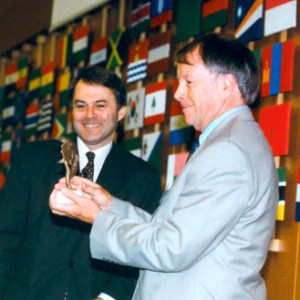 It is with great sadness that ICCROM has learnt of the passing of Colin Pearson, professor at Canberra University in Australia, and ICCROM’s Council Member from 1984 to 1995. He died on Sunday 17 April 2016, at 75 years of age.
It is with great sadness that ICCROM has learnt of the passing of Colin Pearson, professor at Canberra University in Australia, and ICCROM’s Council Member from 1984 to 1995. He died on Sunday 17 April 2016, at 75 years of age.
Born in the Midlands in England on 20 January 1941, Colin studied at the University of Manchester in 1962-66, obtaining both his Master and PhD in corrosion science. He subsequently began a three-year contract as a research scientist at the Materials Research Laboratories in Melbourne. Here he devoted particular attention to researching the conservation of the iron cannon and ballast abandoned by Lieutenant James Cook from his ship HMS Endeavour in 1770. He was made a Member of the Order of the British Empire (OBE) in 1970 as an early recognition for his contribution to corrosion science.
Colin set up the Conservation Department of the Western Australian Museum in Fremantle in 1971, specialising in the treatment of maritime archaeological material from Dutch and colonial shipwrecks on the West Australian coast. He was directly involved in the development of research and training in the conservation of cultural material in South-East Asia, Oceania and Australasia, all regions with humid climates. In 1977, the Australian National Commission for UNESCO, Committee for Museums and Libraries, recommended sponsoring a regional seminar on this subject. The following year the Australian government established bachelor and master-level training programmes in the Conservation of Cultural Materials at the Canberra College of Advanced Education (CCAE). The main subjects were in the areas of the conservation of paper, paintings or objects, including archaeological and ethnographic materials. Colin was the principal lecturer and Head of the Conservation of Cultural Materials. He stayed with the CCAE (later the University of Canberra) for 25 years.
In 1994, Colin was made Officer of the Order of Australia for services to conservation of historical artefacts, and was appointed Professor of Cultural Heritage Conservation at the University of Canberra. He retired in 2004 as Professor Emeritus. In 2014, Colin received the ICOM-CC medal in recognition of his influential role within the field of conservation. He has a long list of publications, focusing on a variety of scientific themes, particularly iron corrosion but also rock art and paper as well as training. His magnum opus is Conservation of Marine Archaeological Objects, published by Butterworth-Heinemann in the Conservation and Museology Series in 1988.
In the early 1980s, Colin contacted ICCROM with a proposal to develop preventive conservation programmes in the Pacific basin. This resulted in a joint needs assessment carried out by ICCROM and the University of Canberra from 1991 to 1993. The outcome was integrated in the PREMO programme in the following years. This enabled among other activities the formation of the Pacific Islands Museums Association (PIMA) to coordinate training and networking in this region.
In 1984 Colin was elected to the ICCROM Council, where he served in an active capacity until 1995. He was member of the Standards and Training Committee from 1986, and served as Vice Chair of the committee until 1990. From 1990 to 1994, he was Chair of the reformed Academic Advisory Board. In this position, he contributed significantly to the development of ICCROM’s training strategies and programme development. In this capacity, he contributed to revising the Training Guidelines then adopted by ICOMOS General Assembly in 1993. He was also Chair of the Ad Hoc Committee to revise Statutes, Procedures of Council, General Assembly and Staff Regulations in 1990-1993, an activity which resulted in major revisions in ICCROM’s administration. As such, Colin Pearson was a key actor in a critical period of ICCROM’s programme development from the 1980s to the 1990s.
For these many important national, regional and international contributions, Colin Pearson was honoured with the ICCROM Award in 2003. On this occasion, he was praised as “clearly among the most versatile and capable conservators of his generation. […] His informal manner, his ability to motivate and inspire, have made him a mentor and colleague to so many of those practicing conservation today.”
ICCROM offers its heartfelt condolences to Colin’s family, and to his personal and professional network of colleagues worldwide.
[gallery royalslider="9" ids="14650,14649,14648,14647,14646,14645"]
